After a 4-hour train journey, my parents and I left the canals of Venice and arrived in the urban maze that is Rome. The first thing we had to adjust ourselves to was the hectic and sometimes lawless traffic. We lost count of how many cars were spotted parking illegally, particularly those at the zebra crossings. We just had to tread the roads with extra care.
Lawlessness of traffic, however, paled in comparison to the general lawlessness on the streets, and we had memorable experiences of the latter during our 3 days in Rome.
Our first encounter with the dark side of Rome was on Via della Conciliazione, not far from the Vatican. Just as we were about to cross the road and were too busy chatting, my dad felt that the zip of his waist pouch was being opened and our 3 passports disappeared without a trace! Of course we were very scared, and could only think of walking back Via della Conciliazione in the hope that the passports were dumped or accidentally dropped there. Soon after our search began, a man approached us with 3 passports in hand and returned them to us. We could only thank our lucky stars that the passport resurfaced so quickly, and when the man then asked for 10 euros as a reward, my dad gave him 20 euros without thinking! Only when we thought the whole incident through later on, did it dawn on us that it was more a plot of making some easy money than stealing passports. How else could one explain that other valuables such as my mobile phone was left intact in the pouch? We thought that there wouldn’t be such a demand for modern passports that are (almost) proof against alterations and forgery. It might in fact have been more profitable to use those passports as some sort of a ransom, when the victims were only more concerned of the safe return of the passports. No wonder why our passports turned up so quickly!
Crowded places are hotbeds for petty crimes, and the second encounter was on a crowded bus. While I was looking hard for a handrail, a man gestured to me that I could hold on to a handrail bar to my right. I thought the man was kind enough to tell me that. But 2 to 3 minutes later, I could feel that someone was digging into the right pocket of my jeans but did not manage to pull my wallet out. My immediate reaction was to place my hand back into the pocket and keep it there for the rest of the journey, even though the bus was very uncomfortably bumpy. The ‘kind’ man alighted the bus very soon after I uncovered the pick-pocketing attempt, and I wouldn’t be too surprised if the pickpocket was actually his accomplice.
My dad also had his brush with pickpockets in the metro, when he felt two women obstructing his boarding of the train. We all thought that the women were trying to create some confusion and irritation, at which point they would have the opportunity to do their business. Luckily their plot did not work out, but we could not believe that we were struck 3 times in 3 days!
As if the petty thieves had not given us enough trouble, we had to take care of another widespread problem, namely the uneven roads. Those roads were paved with cobble and have probably been laid for ages. While aesthetically pleasing, they were not ‘user-friendly’ at all. I compared walking in the streets of Rome to hiking on treacherous trails. Travelling in the buses was not much of a relief either if one has to stand; pity the knees had to absorb all the shock in a bumpy ride! Just as springs lose their elasticity after repeated stretching and compression, my knees and legs were hurting like never before even though I am very used to walking. I was actually quite worried at the beginning as I thought it was a sure sign of ageing … A pedestrian crossing near where we stayed was degraded so badly to a state of real hazard. My dad nearly twisted his ankle twice by the two dips in the road. The locals must have a clever way of navigating those notorious streets!
I may have exaggerated the negative sides of Rome, and maybe I should mention the good aspects as well. Rome is the place to be for those who love ancient monuments and fashion. The monuments and relics are literally around every corner of Rome, and one can easily spend days visiting them all. Rome is also good for spotting fashion with its many boutiques selling different styles and tastes of clothing. Most men were rather well groomed (including the pickpocket corroborator I met on the bus!) while ladies took particular attention to their appearance from head to toe. At times, the busy streets of Rome resembled more of live outdoor fashion shows. My mum thought that the people of Rome actually beat Parisians hands down on their fashion sense. However, in the end we still felt let down by our experiences with the crime and infrastructure in Rome. Perhaps it’s a reflection on the slow decline of Italy in the modern world, as much as what the Roman relics say about the crumbling of the once mighty empire.
離開了「舟」水馬龍的威尼斯,乘四個多鐘頭火車後,便到達了車水馬龍的羅馬。羅馬給我和父母的第一印象,就是人車爭路,而且違例泊車普遍(例如在斑馬線泊車屢見不爽),走路時自然要份外留神。
交通問題始終事小,在羅馬的三天,我們還領教了當地的治安!
第一宗「案件」發生在梵帝岡外的Conciliazione大街,我們正等待過馬路,顧着談天時,家父突然發覺腰包打開了,裡面三本護照不翼而飛!我們當然焦急萬分,祇想到先沿舊路搜索一遍,且看有沒有人嫌護照沒用,把其丟下。未幾有個本地人前來,拿着三本護照交還給我們,我們頓時放下心頭石,歡天喜地連聲道謝之際,該人問我們討10歐元報酬,家父不假思索便掏了20歐元,以為用20歐元換來三本護照也值得,祇是到「賽後檢討」時,才想到此人之意不在護照而在錢,因為腰包內其他物品原封不動(包括手機),而且我們想,護照在意大利沒有市場(現代護照複製、改造都不易),偷拿後趁受害者心慌意亂時用以敲詐錢財豈非更好,要不然為何這麼快便「找」到?
凡是人多地方,無論街上或室內,都是危機四伏,第二宗「案件」就發生在公車上,當時車廂擠,找扶手也不易,一中年人示意我可用右手抓頭上的扶手,心中感激之餘,還想該人真好心,但兩三分鐘後,但覺有人掏右邊褲袋,錢包動了一動,我便警覺地把手插回袋裡,幸好錢包猶在,那個「好心人」也很快下車,之後車子再晃也不敢握扶手,我們猜想,那個「好心人」和小偷,很可能是同黨。
還有第三宗「案件」,就是家父在地鐵時遭兩個女人前後夾擊,阻礙其登車,試圖製造混亂兼趁機盜竊,幸好並無得逞。三日內三驚險,也足說明羅馬的治安。
在羅馬更有一個叫大家「步步為營」的原因,就是其凹凸不平的道路,本來市內的石板路是為了保存古貌,但是華而不實,行走時好比攀山越嶺,站在公車上更苦了膝部承受所有震蕩。就算是彈簧,伸縮得多也會變形,我平時候多走路,也覺得在羅馬的幾天,雙腿和膝部分外累,彷佛一下子衰老了(我起初也如此擔心!)有一條大馬路保養差,過路時路中的窪陷更害了家父兩次,究竟本地人是否像劉蓉對書齋內之窪一樣,既久而遂安之?
羅馬也許沒有像我說得一無是處,如果你喜歡古蹟和古典氣息的話,羅馬的古蹟隨便找個街角都有,你一定會流連忘返,至於女士更會被四周的時裝吸引,因為時裝店不但多,而且各有特色,街上男士都很端莊(包括在公車上的「好心人」),不少女士更精心打扮,在繁忙的街道走,就有點像走進現場Live時裝表演,家母覺得,這點巴黎也給比下去。不過羅馬的治安和建設,的確令其失色,也彷佛在見證着意大利國力的沈淪,正如今日的古蹟和廢墟,亦是羅馬帝國衰敗的印記。
Date of Visit: 23 - 26 October, 2006 遊覽日期:2006年10月23 - 26日
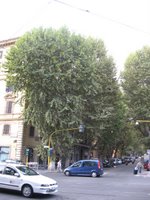
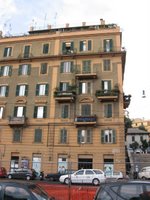

Slightly out of the tourist tracks of Rome, with trees lining the streets (left), a typical residence (centre) and police kiosk (right) . Photographed along Via Labicana.
遊客區外的羅馬:大樹成蔭的街道(左)、地道的高樓底大廈(中)及警岡亭(右)。Via Labicana沿途攝。
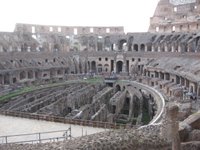
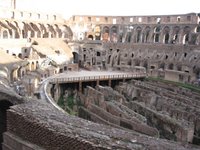
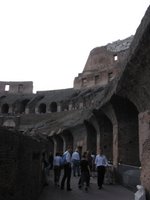
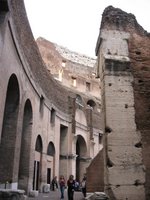
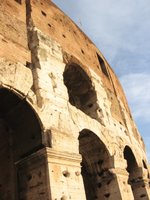
The Colosseum: The arena and its basement (upper row), the passages (lower left and centre) and the wall (lower right).
鬥獸場之競技臺及地窖(左上、右上)、通道(左下、中下)及外牆(右下)
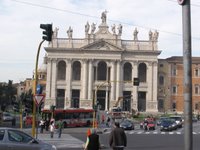
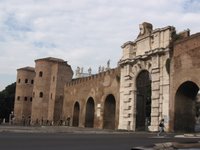
The basilica of San Giovanni and the old city gate nearby (Porta di San Giovanni)
聖約翰教堂及附近之古城門

The statue of San Francesco of Assisi opposite to the basilica of San Giovanni
聖方濟各人像(聖約翰教堂對面)
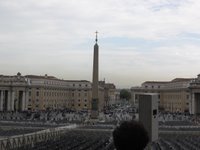
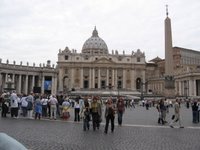
St. Peter's Square (Piazza di San Pietro) at the Vatican
梵帝岡的聖彼得廣場

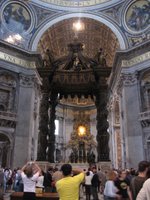
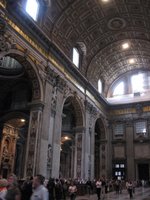
The interior of St. Peter's Basilica of the Vatican
梵帝岡聖彼得大教堂室內
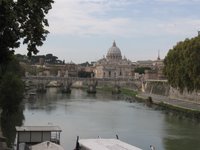
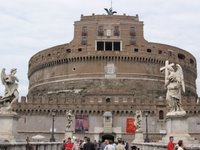
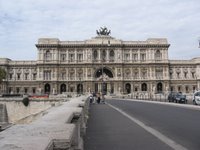
Along the Tiber River (Tevere): The Vatican (top left), Castel di Sant'Angelo (top right) and Palazzo di Giustizia (Palace of Justice; bottom left)
台伯河沿岸的景色:回望梵帝岡(左上)、聖安傑羅城堡(右上)及司法院(左下)

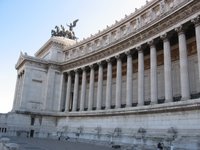
Monumento Vittorio Emanuele II
伊瑪紐爾二世勝利紀念館
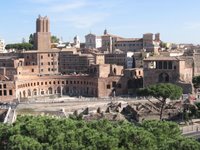
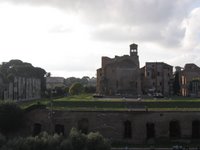
The cradles of ancient Rome: part of the Roman Forum (Foro Romano; left) and the Palatine (Palatino; right)
古羅馬的搖籃:羅馬古墟之部分(左)及帕拉提諾山(右)
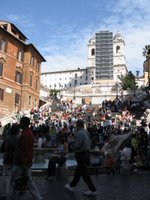

The fountains of Rome: the Spanish Square (Piazza di Spagna; left) and Trevi (right)
羅馬的噴泉:西班牙廣場(左)及 特雷維噴泉(又名許願泉;右)
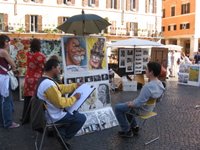
When one's camera doesn't work, there're always portrait artists! (Photographed at Piazza Navona)
相機壞了不要緊,有人為你畫像也可替代!(Navona廣場攝)
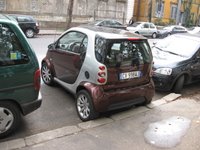
When in Rome, do as the Romans do (including parking)!
正宗羅馬泊車範例!
Lawlessness of traffic, however, paled in comparison to the general lawlessness on the streets, and we had memorable experiences of the latter during our 3 days in Rome.
Our first encounter with the dark side of Rome was on Via della Conciliazione, not far from the Vatican. Just as we were about to cross the road and were too busy chatting, my dad felt that the zip of his waist pouch was being opened and our 3 passports disappeared without a trace! Of course we were very scared, and could only think of walking back Via della Conciliazione in the hope that the passports were dumped or accidentally dropped there. Soon after our search began, a man approached us with 3 passports in hand and returned them to us. We could only thank our lucky stars that the passport resurfaced so quickly, and when the man then asked for 10 euros as a reward, my dad gave him 20 euros without thinking! Only when we thought the whole incident through later on, did it dawn on us that it was more a plot of making some easy money than stealing passports. How else could one explain that other valuables such as my mobile phone was left intact in the pouch? We thought that there wouldn’t be such a demand for modern passports that are (almost) proof against alterations and forgery. It might in fact have been more profitable to use those passports as some sort of a ransom, when the victims were only more concerned of the safe return of the passports. No wonder why our passports turned up so quickly!
Crowded places are hotbeds for petty crimes, and the second encounter was on a crowded bus. While I was looking hard for a handrail, a man gestured to me that I could hold on to a handrail bar to my right. I thought the man was kind enough to tell me that. But 2 to 3 minutes later, I could feel that someone was digging into the right pocket of my jeans but did not manage to pull my wallet out. My immediate reaction was to place my hand back into the pocket and keep it there for the rest of the journey, even though the bus was very uncomfortably bumpy. The ‘kind’ man alighted the bus very soon after I uncovered the pick-pocketing attempt, and I wouldn’t be too surprised if the pickpocket was actually his accomplice.
My dad also had his brush with pickpockets in the metro, when he felt two women obstructing his boarding of the train. We all thought that the women were trying to create some confusion and irritation, at which point they would have the opportunity to do their business. Luckily their plot did not work out, but we could not believe that we were struck 3 times in 3 days!
As if the petty thieves had not given us enough trouble, we had to take care of another widespread problem, namely the uneven roads. Those roads were paved with cobble and have probably been laid for ages. While aesthetically pleasing, they were not ‘user-friendly’ at all. I compared walking in the streets of Rome to hiking on treacherous trails. Travelling in the buses was not much of a relief either if one has to stand; pity the knees had to absorb all the shock in a bumpy ride! Just as springs lose their elasticity after repeated stretching and compression, my knees and legs were hurting like never before even though I am very used to walking. I was actually quite worried at the beginning as I thought it was a sure sign of ageing … A pedestrian crossing near where we stayed was degraded so badly to a state of real hazard. My dad nearly twisted his ankle twice by the two dips in the road. The locals must have a clever way of navigating those notorious streets!
I may have exaggerated the negative sides of Rome, and maybe I should mention the good aspects as well. Rome is the place to be for those who love ancient monuments and fashion. The monuments and relics are literally around every corner of Rome, and one can easily spend days visiting them all. Rome is also good for spotting fashion with its many boutiques selling different styles and tastes of clothing. Most men were rather well groomed (including the pickpocket corroborator I met on the bus!) while ladies took particular attention to their appearance from head to toe. At times, the busy streets of Rome resembled more of live outdoor fashion shows. My mum thought that the people of Rome actually beat Parisians hands down on their fashion sense. However, in the end we still felt let down by our experiences with the crime and infrastructure in Rome. Perhaps it’s a reflection on the slow decline of Italy in the modern world, as much as what the Roman relics say about the crumbling of the once mighty empire.
離開了「舟」水馬龍的威尼斯,乘四個多鐘頭火車後,便到達了車水馬龍的羅馬。羅馬給我和父母的第一印象,就是人車爭路,而且違例泊車普遍(例如在斑馬線泊車屢見不爽),走路時自然要份外留神。
交通問題始終事小,在羅馬的三天,我們還領教了當地的治安!
第一宗「案件」發生在梵帝岡外的Conciliazione大街,我們正等待過馬路,顧着談天時,家父突然發覺腰包打開了,裡面三本護照不翼而飛!我們當然焦急萬分,祇想到先沿舊路搜索一遍,且看有沒有人嫌護照沒用,把其丟下。未幾有個本地人前來,拿着三本護照交還給我們,我們頓時放下心頭石,歡天喜地連聲道謝之際,該人問我們討10歐元報酬,家父不假思索便掏了20歐元,以為用20歐元換來三本護照也值得,祇是到「賽後檢討」時,才想到此人之意不在護照而在錢,因為腰包內其他物品原封不動(包括手機),而且我們想,護照在意大利沒有市場(現代護照複製、改造都不易),偷拿後趁受害者心慌意亂時用以敲詐錢財豈非更好,要不然為何這麼快便「找」到?
凡是人多地方,無論街上或室內,都是危機四伏,第二宗「案件」就發生在公車上,當時車廂擠,找扶手也不易,一中年人示意我可用右手抓頭上的扶手,心中感激之餘,還想該人真好心,但兩三分鐘後,但覺有人掏右邊褲袋,錢包動了一動,我便警覺地把手插回袋裡,幸好錢包猶在,那個「好心人」也很快下車,之後車子再晃也不敢握扶手,我們猜想,那個「好心人」和小偷,很可能是同黨。
還有第三宗「案件」,就是家父在地鐵時遭兩個女人前後夾擊,阻礙其登車,試圖製造混亂兼趁機盜竊,幸好並無得逞。三日內三驚險,也足說明羅馬的治安。
在羅馬更有一個叫大家「步步為營」的原因,就是其凹凸不平的道路,本來市內的石板路是為了保存古貌,但是華而不實,行走時好比攀山越嶺,站在公車上更苦了膝部承受所有震蕩。就算是彈簧,伸縮得多也會變形,我平時候多走路,也覺得在羅馬的幾天,雙腿和膝部分外累,彷佛一下子衰老了(我起初也如此擔心!)有一條大馬路保養差,過路時路中的窪陷更害了家父兩次,究竟本地人是否像劉蓉對書齋內之窪一樣,既久而遂安之?
羅馬也許沒有像我說得一無是處,如果你喜歡古蹟和古典氣息的話,羅馬的古蹟隨便找個街角都有,你一定會流連忘返,至於女士更會被四周的時裝吸引,因為時裝店不但多,而且各有特色,街上男士都很端莊(包括在公車上的「好心人」),不少女士更精心打扮,在繁忙的街道走,就有點像走進現場Live時裝表演,家母覺得,這點巴黎也給比下去。不過羅馬的治安和建設,的確令其失色,也彷佛在見證着意大利國力的沈淪,正如今日的古蹟和廢墟,亦是羅馬帝國衰敗的印記。
Date of Visit: 23 - 26 October, 2006 遊覽日期:2006年10月23 - 26日



Slightly out of the tourist tracks of Rome, with trees lining the streets (left), a typical residence (centre) and police kiosk (right) . Photographed along Via Labicana.
遊客區外的羅馬:大樹成蔭的街道(左)、地道的高樓底大廈(中)及警岡亭(右)。Via Labicana沿途攝。





The Colosseum: The arena and its basement (upper row), the passages (lower left and centre) and the wall (lower right).
鬥獸場之競技臺及地窖(左上、右上)、通道(左下、中下)及外牆(右下)


The basilica of San Giovanni and the old city gate nearby (Porta di San Giovanni)
聖約翰教堂及附近之古城門

The statue of San Francesco of Assisi opposite to the basilica of San Giovanni
聖方濟各人像(聖約翰教堂對面)


St. Peter's Square (Piazza di San Pietro) at the Vatican
梵帝岡的聖彼得廣場



The interior of St. Peter's Basilica of the Vatican
梵帝岡聖彼得大教堂室內



Along the Tiber River (Tevere): The Vatican (top left), Castel di Sant'Angelo (top right) and Palazzo di Giustizia (Palace of Justice; bottom left)
台伯河沿岸的景色:回望梵帝岡(左上)、聖安傑羅城堡(右上)及司法院(左下)


Monumento Vittorio Emanuele II
伊瑪紐爾二世勝利紀念館


The cradles of ancient Rome: part of the Roman Forum (Foro Romano; left) and the Palatine (Palatino; right)
古羅馬的搖籃:羅馬古墟之部分(左)及帕拉提諾山(右)


The fountains of Rome: the Spanish Square (Piazza di Spagna; left) and Trevi (right)
羅馬的噴泉:西班牙廣場(左)及 特雷維噴泉(又名許願泉;右)

When one's camera doesn't work, there're always portrait artists! (Photographed at Piazza Navona)
相機壞了不要緊,有人為你畫像也可替代!(Navona廣場攝)

When in Rome, do as the Romans do (including parking)!
正宗羅馬泊車範例!
Comments
真的能與中國相比
這樣的地方怎樣美我也沒興趣去
找天要跟你爸媽聊一下他們這次旅遊体驗